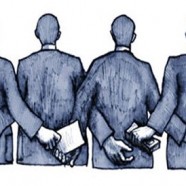
Corruption throughout the world has grown to epidemic levels. Every day there seems to be another incidence of bribery, cronyism, counterfeiting, slush funds, or a political scandal somewhere. Behind each act is someone abusing his/her power to unfairly gain personal wealth at the expense of the common citizen. While corruption takes many forms, each type can have a devastating impact on brands that are directly involved or even just affiliated with such unfair acts, – e.g. in our political systems, business leaders, governments, etc. In particular, this trend undermines the credibility, integrity and trust necessary for brands to sustain an emotional relationship with target customers, the hallmark for strong brands.
Pew Research revealed in 2014 that 76% of people generally believe that corrupt political leaders across 34 emerging economies are a “very big problem”. This perception of corruption has increased since 2007, with +15% in China, +12% in Russia, +10% in Argentina and +9% in Mexico. The Economist’s “Crony Capitalism” index (i.e. tycoons benefiting from close ties in Government, from string-pulling to bribery) shows that the worth of billionaires in crony industries is $1.75 trillion today, with Russia as the worst offender. Recent examples of different types of corruption negatively impacting brands include:
- FIFA – the scandal for this international governing body of soccer has reinforced its reputation as one of the most corrupt organizations on earth. Key partners and sponsors of the 2014 World Cup, such as Sony, Visa, Adidas, Coca-Cola, Budweiser and McDonalds, all experienced a sullied effect on their brand image by the 3.4 billion television viewers. Related to this, the extensive bribery involved in the Qatar bid for the 2022 World Cup significantly tarnished the image of this country, as well as FIFA itself.
- Brazil – bribery and graft have been an integral part of its culture for years, much like other Latin countries (e.g. Venezuela, Mexico, Argentina), but emerging evidence of severe economic mismanagement, corruption, and political ineptitude has been uncovered by courageous journalists. This has led to the recent congressional vote to initiate impeachment charges against President Dima Rousseff. The brand image of Brazil as an up-and-coming country worthy of serious investment consideration will remain dubious for many years as a result.
- Corporate “Fat Cats and Big Bonuses” – public anger over excessive, unjustified CEO compensation, including bonuses, especially in contrast to the growing inequality of income, has undermined the overall brand image of many companies. In April, shareholders rejected a pay raise of 20% for Bob Dudley, the CEO of BP, for overseeing its biggest-ever operating loss. This was the latest example of the expanding bad publicity of corporations. While this is not a crime per se, more companies are now linking bonuses to performance. Since 2011, the incidence of S&P 500 firms tying pay to performance has jumped from 63% to 83%.
- Chinese Counterfeits – the infringement of trademarks and copyrights, or “intellectual property”, has become a vast global business, and a huge cost to international, well-known brands, from fakes of Ferragamo shoes, to Luis Vuitton baggage, to medicines and computer software brands. The OECD estimates that the total value of cross border trade in fakes has grown from $250 billion in 2007, or 1.8% of the total for all goods, to $461 billion and 2.5% in 2013. China (including Hong Kong) is the main culprit, accounting for 84% of all seizures, and involves more than half of the $1.25 billion worth of fake products seized by the American Customs Bureau last year (American brands are most vulnerable to piracy).
- Volkswagen – the addition of software to cheat on emission testing was a colossal blunder. The VW brand always had an impressive reputation for promising and delivering innovative quality, reliability and enduring value, reflecting German engineering skill. Now the trust built for VW, plus other German cars by association, has been severely damaged, an impact on the brand that will go beyond the $18 billion to fix this software problem.
- America – Country Perception – Transparency International measures every year “the degree to which corruption is perceived to exist among public officials and politicians”. Since 1995 the five top rated countries have been in Scandinavia, plus New Zealand and Netherlands, with high scores in 2015 from 91-87. What is surprising to many is the relatively low rating for the U.S. (16th and 76), which is due mainly to its lack of transparency and the limited regulations (or loop holes?) for financial reporting on foreign subsidiaries. The issue of trust has also become very apparent for supporting political candidates in these bizarre primaries – e.g. Trump (ranked 104 on the Economist individual “Crony Capitalism” list), Hillary and Cruz. Even the integrity of the primary system for selecting candidates has been questioned as being unfair and not accurately reflecting the preferences of all voters (e.g. most states don’t include “Independents”). Earlier this year, a Gallup poll revealed that three-fourths of Americans believe that “corruption (not incompetence) is widespread in the U.S. Government”.
All these diverse examples are case studies of different types of brands becoming more vulnerable, but the constant problem for each is a decline of trust and credibility resulting from some form of corruption or unfair behavior. What is needed is a top-down push to create and enforce new regulations for more transparency and competition, plus a more proactive communications effort to expose all sources of corruption throughout the world.


